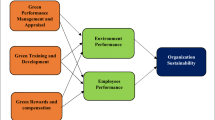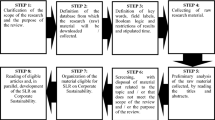Abstract
Understanding Human Resource Management (HRM) and linking it with sustainability is a cumbersome task. When management is linked with sustainability, it becomes Green Human Resource Management (GHRM) that includes finding various gaps that affects sustainability of an organization and impacts employee’s capacity to balance their professional and personal lives. It is necessary to understand the role of green HR practices prevailing in an organization thus impacting behaviour and productivity of employees. This article attempts to address the gap by performing bibliometric analysis for addressing the relationship between GHRM and sustainability of an organization. A Funnel Model Approach is used to categorise the theoretical and clear understanding of the articles studied and determining new areas of research. In addition to this, the works are presented in hierarchical form by creating customized ontology of the studied works of four levels of funnel approach.





Similar content being viewed by others
References
Rimanoczy I, Pearson T (2010) Role of HR in the new world of sustainability. Ind Commer Train 42(1):11–17. https://doi.org/10.1108/00197851011013661
Pierre B, Agnes N, Arthur M (2003) Through the paradigm funnel: a conceptual tool for literature analysis. Mark Educ Rev 13(2):55–66. https://doi.org/10.1080/10528008.2003.11488830
Jabbour CJC, Renwick DWS (2018) The soft side of environmentally-sustainable organizations. RAUSP Manag J 53(4):622–627. https://doi.org/10.1108/RAUSP-07-2018-0044
Jackson SE, Renwick DWS, Jabbour CJC, Muller-Camen M (2011) State-of-the-art and future directions for green human resource management: introduction to the special issue. Ger J Res Hum Resour Manag 25(2):99–116. https://doi.org/10.1688/1862-0000
Yong YJ, Yusliza YM, Ramayah T, Fawehinmi O (2019) Nexus between green intellectual capital and green human resource management. J Clean Prod 215:364–374
Cohen E, Taylor S, Muller-Camen M (2010) HR’s role in corporate social use and management of downsizing responsibility and sustainability
Stoll PJ (2001) Environmental training. Chem Eng Prog 97(9):42–45
Srivastava AP, Shree S (2019) Examining the effect of employee green involvement on perception of corporate social responsibility: Moderating role of green training. Manag Environ Qual Int J 30(1):197–210. https://doi.org/10.1108/MEQ-03-2018-0057
Thomas NG, Pat C, Noreen H (1995) The emergence of strategic human resource development. J Eur Ind Train 19:4–10. https://doi.org/10.1108/03090599510095816
Safari A, Salehzadeh R, Panahi R, Abolghasemian S (2018) Multiple pathways linking environmental knowledge and awareness to employees’ green behaviour. Corp Gov (Bingley) 18(1):81–103. https://doi.org/10.1108/CG-08-2016-0168
Wiernik BM, Dilchert S, Ones DS (2016) Age and employee green behaviors: a meta-analysis. Front Psychol. https://doi.org/10.3389/fpsyg.2016.00194
Ahmad S (2015) Green human resource management: policies and practices. Cogent Bus Manag 2(1):1–13. https://doi.org/10.1080/23311975.2015.1030817
Aragão CG, Jabbour CJC (2017) Green training for sustainable procurement? Insights from the Brazilian public sector. Ind Commer Train 49(1):48–54. https://doi.org/10.1108/ICT-07-2016-0043
Teixeira AA, Jabbour CJC, Jabbour ABLDS (2012) Relationship between green management and environmental training in companies located in Brazil: a theoretical framework and case studies. Int J Prod Econ 140(1):318–329. https://doi.org/10.1016/j.ijpe.2012.01.009
Lee KH, Scott N (2015) Food tourism reviewed using the paradigm funnel approach. J Culin Sci Technol 13(2):95–115. https://doi.org/10.1080/15428052.2014.952480
Dewey A, Drahota A (2016) Introduction to systematic reviews: online learning module. Cochrane Training
Paillé P, Chen Y, Boiral O, Jin J (2014) The impact of human resource management on environmental performance: an employee-level study. J Bus Ethics 121(3):451–466. https://doi.org/10.1007/s10551-013-1732-0
Yusliza MY, Othman NZ, Jabbour CJC (2017) Deciphering the implementation of green human resource management in an emerging economy. J Manag Dev 36(10):1230–1246. https://doi.org/10.1108/JMD-01-2017-0027
Dumont J, Shen J, Deng X (2016) Effects of green HRM practices on employee workplace green behavior: the role of psychological green climate and employee green values. Hum Resour Manag. https://doi.org/10.1002/hrm.21792
Terry D, Vanja D, Hairong L, Leckenby J (2017) Establishing a paradigm: a systematic analysis of interactive advertising research. J Interact Advert 17(1):65–78. https://doi.org/10.1080/15252019.2017.1326755
Markey R, McIvor J, Wright CF (2016) Employee participation and carbon emissions reduction in Australian workplaces. Int J Hum Resour Manag 27(2):173–191
Jackson SE, Seo J (2010) The greening of strategic HRM scholarship. Organ Manag J 7(4):278–290
Nejati M, Rabiei S, Jabbour CJ (2017) Envisioning the invisible: understanding the synergy between green human resource management and green supply chain management in manufacturing firms in Iran in light of the moderating effect of employees’ resistance to change. J Clean Prod 168:163–172. https://doi.org/10.1016/j.jclepro.2017.08.213
Guerci M, Montanari F, Scapolan A, Epifanio A (2016) Green and nongreen recruitment practices for attracting job applicants: exploring independent and interactive effects. Int J Hum Resour Manag 27(2):129–150
Guerci M, Longoni A, Luzzini D (2016) Translating stakeholder pressures into environmental performance–the mediating role of green HRM practices. Int J Hum Resour Manag 27(2):262–289
Robertson JL, Barling J (2013) Greening organizations through leaders’ influence on employees’ pro‐environmental behaviors. J Organ Behav 34(2):176–194
Norton TA, Zacher H, Parker LS, Ashkanasy MN (2017) Bridging the gap between green behavioral intentions and employee green behavior: the role of green psychological climate. J Org Behav 38(7):996–1015. https://doi.org/10.1002/job.2178
Rayner J, Morgan D (2018) An empirical study of ‘green’ workplace behaviours: ability, motivation and opportunity. Asia Pac J Hum Resour 56(1):56–78
Chaudhary R (2018) Can green human resource management attract young talent? An empirical analysis. Evid-Based HRM 6(3):305–319
Tian H, Zhang J, Li J (2020) The relationship between pro-environmental attitude and employee green behavior: the role of motivational states and green work climate perceptions. Environ Sci Pollut Res 27(7):7341–7352
Saeed BB, Afsar B, Hafeez S, Khan I, Tahir M, Afridi MA (2019) Promoting employee’s proenvironmental behavior through green human resource management practices. Corp Soc Responsib Environ Manag 26(2):424–438
Pinzone M, Guerci M, Lettieri E, Huisingh D (2019) Effects of ‘green’ training on pro-environmental behaviors and job satisfaction: evidence from the Italian healthcare sector. J Clean Prod 226:221–232
Ajzen I (2012) The theory of planned behavior. Handbook of theories of social psychology, vol 1. Sage Publications, London, pp 438–459
Al Kerdawy MMA (2019) The role of corporate support for employee volunteering in strengthening the impact of green human resource management practices on corporate social responsibility in the Egyptian firms. Eur Manag Rev 16(4):1079–1095
Singh G, Jain V, Singh M (2013) Ontology development using Hozo and semantic analysis for information retrieval in semantic web. In: IEEE Second International Conference on Image Information Processing (ICIIP-2013), Shimla, India. pp 113–118. https://doi.org/10.1109/ICIIP.2013.6707566
Yadav J, Saini AK, Yadav AK (2021) Designing conceptual model and statistical validation for Government-citizen participation model in Indian context. Int J Inf Technol 13:637–645. https://doi.org/10.1007/s41870-020-00563-0
Yadav J, Saini AK, Yadav AK (2022) Analysing and securing the sustainability of e-Government projects from technical aspect using employees perspective approach. Int J Inf Technol 14:1131–1143. https://doi.org/10.1007/s41870-019-00333-7
Quamara S, Singh AK (2022) SChain: towards the quest for redesigning supply-chain by augmenting blockchain for end-to-end management. Int J Inf Technol 14:2343–2354. https://doi.org/10.1007/s41870-022-00959-0
Aggarwal M, Nilay K, Yadav K (2017) Survey of named data networks: future of internet. Int J Inf Technol 9:197–207. https://doi.org/10.1007/s41870-017-0014-y
Elgamal MA, Younis LY, Abdou HA et al (2023) Framework for evaluating reliability of stochastic flow networks under different constraints. Int J Inf Technol. https://doi.org/10.1007/s41870-023-01312-9
Author information
Authors and Affiliations
Corresponding author
Ethics declarations
Conflict of interest
There are no conflicts of interests associated with this study.
Rights and permissions
Springer Nature or its licensor (e.g. a society or other partner) holds exclusive rights to this article under a publishing agreement with the author(s) or other rightsholder(s); author self-archiving of the accepted manuscript version of this article is solely governed by the terms of such publishing agreement and applicable law.
About this article
Cite this article
Chand, R., Nijjer, S., Jandwani, A. et al. A novel funnel and ontological mechanism for sustainable Green Human Resource Management (GHRM). Int. j. inf. tecnol. 16, 369–374 (2024). https://doi.org/10.1007/s41870-023-01622-y
Received:
Accepted:
Published:
Issue Date:
DOI: https://doi.org/10.1007/s41870-023-01622-y




